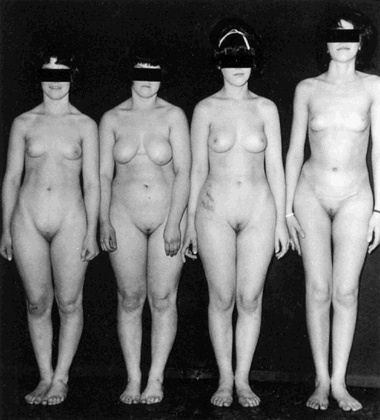
Androgen Insensitivity Syndrome (AIS):
[formerly, Testicular Feminization Syndrome (TFS)] an X-linked recessive trait
AIS is
associated with an Androgen
Receptor locus on the long arm of the X chromosome (Xq11-q12). Individuals have the XY karyotype typical of males, but
the fetus in early development is unable to respond to
androgen necessary to develop functional male gonads. physically and psycho-sexually as
typical females. Development
of some secondary sex characteristics (e.g., enlargement of
the breasts) may be unimpaired, whereas axillary and pubic
hair are typically absent. A stereotype (with some support from clinical
studies) is that AIS women are often tall, thin, and
unusually attractive, which has led to unfounded rumors that
various actresses or models
have AIS. Often, individuals with AIS are diagnosed only when they fail to
menstruate at puberty. AIS appears
to be due to an inability of tissues to respond to androgen.
Women with TFS are
invariably sterile, with a blind vagina, underdeveloped
uterus, and (typically) rudimentary testes. Consequently, the
AIS allele is not
passed on by XY individuals, but by their asymptomatic heterozygous XX sisters.
The photo above is typical of older genetics and medical textbooks, in which various genetic conditions are 'medicalized' by presentation as anonymized [taped eyes] bodies in unflattering photographs, rather than as people [below]. Familiarity with the characteristic presentation of genetic syndromes is an important part of medical education. It may also be argued whether such presentations stigmatize individuals. Self- and peer-acceptance are typically a major concern for affected individuals.
Institution of gender testing in international athletic competition, notably the 1968 Olympic Games, was intended to identify male athletes who allegedly sought a competitive advantage by "passing" as female, after having undergone hormone treatment. No such individuals were detected, however women with AIS and an XY karyotype who therefore "tested negative" for Barr Bodies were routinely identified, and in some cases deprived of their medals. This goes to general questions of LGBTQ persons in sport. The name AIS replaces the older designation as Testicular Feminization Syndrome (TFS), because of the implication that the women are "feminized men" rather than women with an atypical karyotype.

The photo above is typical of older genetics and medical textbooks, in which various genetic conditions are 'medicalized' by presentation as anonymized [taped eyes] bodies in unflattering photographs, rather than as people [below]. Familiarity with the characteristic presentation of genetic syndromes is an important part of medical education. It may also be argued whether such presentations stigmatize individuals. Self- and peer-acceptance are typically a major concern for affected individuals.
Institution of gender testing in international athletic competition, notably the 1968 Olympic Games, was intended to identify male athletes who allegedly sought a competitive advantage by "passing" as female, after having undergone hormone treatment. No such individuals were detected, however women with AIS and an XY karyotype who therefore "tested negative" for Barr Bodies were routinely identified, and in some cases deprived of their medals. This goes to general questions of LGBTQ persons in sport. The name AIS replaces the older designation as Testicular Feminization Syndrome (TFS), because of the implication that the women are "feminized men" rather than women with an atypical karyotype.